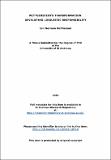Wittgenstein's transformation : developing linguistic responsibility
Abstract
This thesis offers a development of work on and with L. J. J.
Wittgenstein by R. Bambrough (1969 etc.), S. Cavell (1979 etc.), J. C.
Edwards (1982), P. Hacker (1986 etc.), F. Kerr (1986), N. Lash (1988), N,
Malcolm (1960 etc.), D. Pears (1987 etc.), D. Z. Phillips (1965 etc.), R.
White (1982), P. Winch (1972 etc.) and others.
It is argued that all Wittgenstein’s philosophical work coheres with his
inclusive spirituality, Jewish and Christian, in seeking to express the
dialectics of the sublime in the pedestrian. The most important
chapters (one, seven and eight) cannot be fully understood without the
others.
Wittgenstein’s inclusive concern with transforming philosophy, himself
and all friends within reach, expresses his sense of responsibility for
the language that we use and have, share and actively are. This
intensive and comprehensive responsibility, with eschatological and
apocalyptic affinities, shows in his ethics of descriptive grammar.
Since languages and concepts are ways and means for procedural
knowledge, his ethics of description is also an ethics, aesthetics and
theology of perceptive equilibration in understanding, interpretation
and family-resemblances. Inclusive spirituality involves Anselmian
transcendence.
Wittgenstein’s inclusive spirituality is maintained to be a revised and
radicalised version of Augustine’s regulative dialectics of inclusive
grammar, free from his exclusive theories of language-development and
predestination. Wittgenstein’s simplest and potentially most powerful
presentation of Augustine’s grammar is the third "great difficulty" in
his ethics of 1929. This integrates Wittgenstein’s work as a vital open
system, akin to eastern trinitarianism. His dialectics of the sublime
are related to William James, Tolstoy, Emerson, Pascal, Hamann, Kant,
Schopenhauer, Kierkegaard, Kraus, Weininger, Dostoevsky, Barth and
others. Convergences between Wittgenstein and Barth are considered,
particularly with regard to the letter's lecture on ethics, published in
1924 (1928 in English), and the beginning of Church Dogmatics (1932
onwards). Wittgenstein's theological and religious reticence is finally
argued to be his way of leaving his gift before the place where
sacrifice was once offered, as he works on his remembering of
unreconciled others. (Matthew 5:23-24). His "third (greatest)
difficulty" is the greatest difficulty.
Type
Thesis, PhD Doctor of Philosophy
Collections
Items in the St Andrews Research Repository are protected by copyright, with all rights reserved, unless otherwise indicated.

